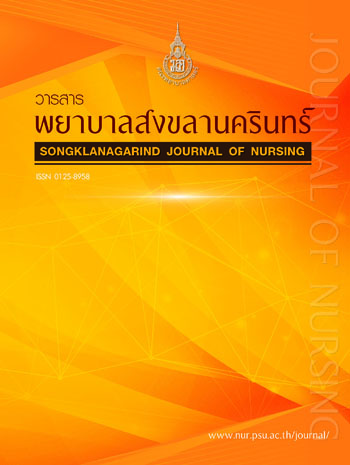Effects of Integrated Ventilator Weaning Program on the Reduction of Uncertainty Feeling in Older Patients
Main Article Content
บทคัดย่อ
A number of patients with critical illness are intubated until their clinical condition is better. Weaning
elderly patients off of ventilators is challenging. This study aimed to examine the effects of an integrated
ventilator weaning program on the uncertainty and time spent in breathing as tolerate during weaning process
of older patients at a university hospital in Southern Thailand. First 25 patients and 25 family caregivers were
purposively selected to be in the control group which received usual care. After data collection of the control
group completion, 25 patients and 25 family caregivers were purposively selected to be in the experimental
group. The experimental group received the integrated ventilator weaning program which was developed
based on the uncertainty in illness framework of Mishel. Instruments used for data collection included (1)
the Demographic and Illness Questionnaire (DIQ), (2) the Uncertainty for Weaning Assessment (UWA),
(3) The Weaning Flow Sheet (WFS) for recording time and parameters during weaning, and (4) The semi
structured interview questions. Five participants who were successfully removed endotracheal tube during
the program were interviewed to explore their experience during the weaning phase. Demographic data were
analyzed by using descriptive statistics and Chi-Square test. The uncertainty scores and time spent during
the weaning process were analyzed by using paired t-test and independent t-test. Content analysis was used
to analyze qualitative data.
After intervention completion, mean scores of uncertainty of the intervention group were statistically
significantly lower than before receiving the intervention (p< .05), mean scores of uncertainty of the
intervention group were statistically significantly lower than those in the control group (p< .05). There was
no statically significant difference of time spent in weaning process between both groups. Qualitative data
analysis revealed that the integrated ventilator weaning program helped the patients reduce uncertainty and
promote their ability of breathing.
The findings indicate that the integrated ventilator weaning program could reduce uncertainty feeling
in older patients. However, the program could not extend time of breathing as tolerate during weaning
process.


